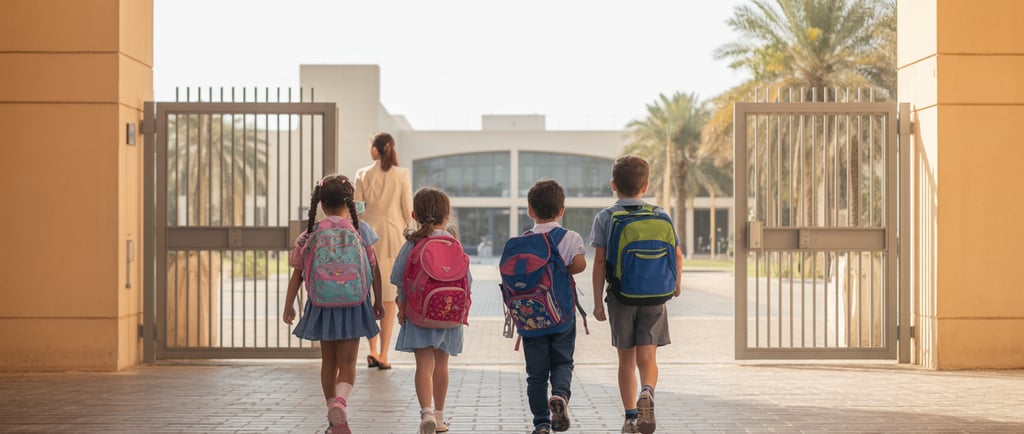Back-to-School UAE 2025: Parents’ Last-Minute Guide (Dates, Rules & Deals)
UAE back-to-school 2025 guide for parents: first-day dates, new rules, bus safety, uniform & device policies, smart shopping checklist and lunchbox tips.
UAE TRAVEL TIPS
8/26/20257 min read


Quick Facts about the 2025 Academic Year
The 2025 academic year for schools in the United Arab Emirates (UAE) is set to commence on August 28, 2025. This start date highlights a slight shift towards later summer terms, impacting the overall structure of the academic calendar. Parents and students should be aware that the academic year for most schools will consist of two main semesters, allowing for a well-rounded educational experience throughout the year.
Students will have several scheduled breaks, designed to provide periods of rest and rejuvenation for both pupils and educators. The first significant break will coincide with the public holiday celebrations, notably the Islamic holiday of Eid al-Adha, and is expected to last approximately one week. Following this, there will be a mid-term break in late October, providing families with a chance to regroup and recharge as they navigate through the school year.
The winter holidays will commence at the end of December, aligning with traditional celebrations and family gatherings, extending through the beginning of January. This festive period allows students to engage in various activities outside the academic environment, thereby enhancing their overall learning experience. Additionally, a spring break is scheduled for March, serving as a brief but crucial intermission before the final term of the school year begins.
By understanding these key facts regarding the academic calendar, parents can strategically plan for childcare, vacations, and family gatherings throughout the school year. Accurate awareness of school dates, breaks, and holidays is essential for parents to ensure their children have a balanced and enriching academic experience, making the transition to the 2025 school year smoother for everyone involved.
Key Dates for the Academic Year
The academic year 2025 in the UAE will commence on a scheduled date, marking the beginning of another educational cycle for students. The start of the term is set for September 1, 2025, allowing families time to prepare for their children’s return to school. Following this initial period, the first term will conclude on December 15, 2025. This term is vital for students to acclimate to their studies and prepare for assessments.
Following the first term break, which runs from December 16, 2025, to January 2, 2026, students will return for the second term, beginning on January 3, 2026. This second term is typically rigorous, as assignments and projects commence. The conclusion of this term is marked for March 21, 2026, followed by a well-deserved holiday from March 22, 2026, to April 6, 2026.
The third and final term will commence on April 7, 2026, leading students toward the culmination of their academic year. This term will conclude on June 30, 2026. During this period, students will also undergo significant examinations, which are critical for their academic progression. The examination dates are typically scheduled towards the end of the third term, and parents should remain attentive to update their calendars accordingly.
In addition to the term dates, it is important to note public holidays, including National Day, which falls on December 2, and Eid holidays, the dates of which vary annually. Awareness of these key dates will assist parents in planning family events and managing schedules effectively throughout the 2025 academic year, ensuring their children are well-prepared for school. Keeping track of these dates can significantly enhance time management, facilitating a smoother transition back to school.
What’s New in Education: AI Literacy and Continuous Assessment
As we approach the 2025 academic year in the UAE, educational initiatives continue to evolve, with a specific emphasis on AI literacy and the implementation of continuous assessments. These changes are not merely trends; they mark a significant shift in how educational institutions engage learners and prepare them for the future.
AI literacy is becoming an integral part of the curriculum, reflecting the growing importance of artificial intelligence in everyday life and the job market. Schools are introducing programs that not only teach the fundamentals of AI technology but also encourage critical thinking about its ethical implications. This initiative aims to equip students with the skills needed to navigate a world increasingly influenced by AI, thus fostering a generation of informed citizens who can harness technology responsibly. Parents can support this initiative by engaging in conversations with their children about AI, encouraging exploration of related subjects, and providing resources that can deepen their understanding.
Moreover, the continued focus on assessment methods is shifting from traditional examinations to a more holistic approach known as continuous assessment. This strategy allows for regular evaluations of student performance, highlighting strengths and areas needing improvement throughout the academic year. Continuous assessments can take various forms, such as presentations, group projects, and practical applications of knowledge, which promote collaborative learning and critical skills beyond rote memorization. For parents, recognizing the value of this approach is essential, as it fosters a growth mindset in children. Engaging with teachers and participating in school activities can provide further insight into how continuous assessments are integrated into the learning experience.
In conclusion, the advancement of AI literacy and continuous assessment in the UAE's education system represents a definitive step towards modernizing learning. By understanding these changes, parents can better support their children in adapting to the evolving landscape of education, ensuring they are well-equipped for future challenges.
Back-to-School Checklist and Smart Shopping Tips
As the new academic year approaches, parents in the UAE must prepare by creating an effective back-to-school checklist to ensure their children have all the necessary items for a successful start. The first week of school can be bustling, therefore outlining essential supplies and adhering to school guidelines becomes imperative.
Begin with a comprehensive checklist that includes fundamental items such as bags, notebooks, writing instruments, and educational resources. Uniforms are particularly important, as most schools have specific dress codes. Make sure to verify uniform requirements through the school’s website or administration office. It is advisable to purchase uniforms in advance, as popular sizes tend to sell out quickly due to high demand around back-to-school season.
In today’s digital age, many schools require students to have electronic devices, particularly laptops or tablets. Be informed about the school’s policy on devices to ensure compliance. Consider purchasing a device that compliments educational goals, focusing on specifications suitable for academic use. More importantly, ensure proper insurance coverage for electronic devices, as accidents can occur.
Transportation is another crucial aspect of back-to-school preparation. Parents should familiarize themselves with safe routes and timings if their children will be taking public transport, such as RTA buses. Utilizing reliable apps for navigation can enhance safety and efficiency during travel. Additionally, engage with your children about road safety tips, especially if they are new to commuting independently.
When it comes to shopping tips, prioritizing bulk purchasing for essential items can reduce costs. You might want to scout local markets and utilize online platforms for competitive pricing. Signing up for retailers’ newsletters can also yield exclusive discounts that can be beneficial for families. By following these guidelines, parents can ease the transition into the new school year, creating a more organized and enjoyable start for their children.
Lunchbox Considerations and Allergy Notes
As the new school year approaches in the UAE, parents often face the challenge of packing healthy, appealing lunches for their children. Nutritional balance, food preferences, and potential allergies should all be taken into account when creating a lunchbox that meets both dietary needs and taste preferences. A well-structured lunch can significantly improve children's energy levels and focus throughout the school day.
To promote a healthy lunch, it's essential to include a variety of food groups. Incorporating fruits and vegetables is crucial, as they provide necessary vitamins and minerals. Options like carrot sticks, cucumber slices, or a variety of seasonal fruits such as apples or bananas can be appealing in both flavor and texture. Whole grains should also feature prominently in lunchboxes, as they supply energy and keep children full. Whole grain bread, wraps, or brown rice can be excellent choices for sandwiches or sides.
However, parents must also be particularly vigilant regarding food allergies, which can have severe implications in a school setting. It is important to communicate with teachers and school staff about any allergies your child may have. When preparing lunch, consider potential allergens such as nuts, dairy, or gluten. There are numerous alternatives available; for instance, sunflower seed butter can substitute for traditional peanut butter. This allows children with allergies to enjoy similar flavors without the risk of exposure.
In addition, setting aside some time for children to help in meal preparation can encourage them to take ownership of their lunches. Involving them in decisions ensures that they enjoy what is packed and increases the likelihood that they will consume the meals provided. By thoughtfully considering nutrition and food allergies, parents can create lunchboxes that not only satisfy their children’s appetites but also contribute to a healthier school environment.
Mini FAQ: Quick Answers to Common Questions
As the back-to-school season approaches in the UAE for 2025, parents may have several pressing inquiries regarding school policies, health regulations, and logistics. Here are succinct answers to three common questions that could help parents navigate this transitional period smoothly.
1. What are the current school policies regarding attendance and absences?
In the UAE, schools typically have defined attendance policies that mandate students to attend classes regularly. Parents should familiarize themselves with the specific attendance requirements set by their child’s school, as policies can vary between institutions. Generally, schools may permit a specified number of absences for valid reasons such as illness, family emergencies, or other extraordinary circumstances. It is advisable for parents to communicate directly with school administration to ensure compliance with these policies, especially if they anticipate extended absences.
2. What health regulations should parents be aware of for the new school year?
Health regulations in UAE schools have adapted to ensure the safety of all students. Measures may include vaccination requirements, regular health screenings, and protocols for illness response. Parents should check the latest guidance from both the Ministry of Education and the respective school regarding any mandatory vaccinations or health checks required before the academic year starts. Staying informed on these regulations is crucial to ensure a safe learning environment for children.
3. How can parents manage logistics effectively for back-to-school preparations?
Logistical preparation is essential for a smooth start to the new school year. Parents can manage logistics by creating checklists covering school supply lists, uniforms, transportation arrangements, and meal planning. Moreover, it can be beneficial to establish a daily routine that accommodates school timings and after-school activities. Early organization can alleviate stress and help ensure that both parents and students are prepared for the return to school.
Categories
© 2025. All rights reserved.
Quick Links
Save on flights & stays from the UAE.


